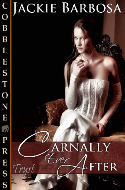Opinions Are Like...
 Gotcha, didn't I?
Gotcha, didn't I?
I'm not going to complete that thought quite the way you probably expected. You see, I've been following the kerfuffles in the blogosphere over some authors' bad behavior vis-a-vis negative Amazon reviews. While I have no intention of bringing the heated debate here, it's made me realize one of the most important mantras an author can learn after being published is:
Opinions are like backsides: it's best to keep yours to yourself.Now, I don't mean published authors are enjoined never to express opinions about anything. I think, for example, it's perfectly okay to state their opinions about thong underwear (I hate them), brussel sprouts (am slowly coming around to them), and sushi (yum!).
But when it comes to other people's opinions about your work (aka reviews, particularly the negative ones), it is never a good idea to argue, explain, or otherwise defend yourself, even when the reviewer is clearly wrong. Because just like it's the kid who throws the retaliatory punch on the playground that gets sent the principal's office, when an author responds to a negative review, it never ends well for the author.
Before my first story was published, I worried a lot about how I'd feel about negative reviews. I'm an inveterate fixer, and if someone doesn't like something I've written, my natural impulse is to want to make it better. But a work of fiction, once finished and published, isn't fixable. It is what it is. And I didn't know quite how I'd handle that impotence.
As it turned out, I've only seen one review of the story that could be considered negative. And I'll admit, reading it didn't make me feel great. But it was also a very honest and well-reasoned opinion, and I appreciated that the writer took the time to think about my story and express her feelings about it so clearly. At the same time, however, my impulse was to explain away her criticisms, but I managed to refrain. It wasn't easy, but in the end, the story has to speak for itself, and it didn't speak to her. And that's okay.
To further illustrate my point, I entered Wickedly Ever After in a contest for unpubbeds a while back. It didn't final, and when the scoresheets/comments came back in the mail, I deliberately didn't open them because I didn't want to be discouraged from completing the story by what I found there. Good thing I didn't. I finally got around to opening them yesterday, and the scores and comments were not encouraging. Oh, they weren't horrible, but I'd certainly never have had the audacity to submit the story to Kensington if I'd read that feedback first.
Which just goes to prove--one reader's "meh" is another reader's "fabulous." And you just never know.
It's certainly difficult to separate our personal feelings from our work. We pour so much of ourselves into every page, it's hard not to want everyone to love our every word. Realistically, though, that's not going to happen. Not even the world's greatest writers are universally loved, after all. There is, as they say, no accounting for taste!
YOUR TURN: How do you handle "constructive criticism?" Do you think an author can ever respond to a negative review without coming off badly?
 So... even though my book isn't out until Spring 2009 (April is the word on the street these days), I just got my first review! Click here to
So... even though my book isn't out until Spring 2009 (April is the word on the street these days), I just got my first review! Click here to 






